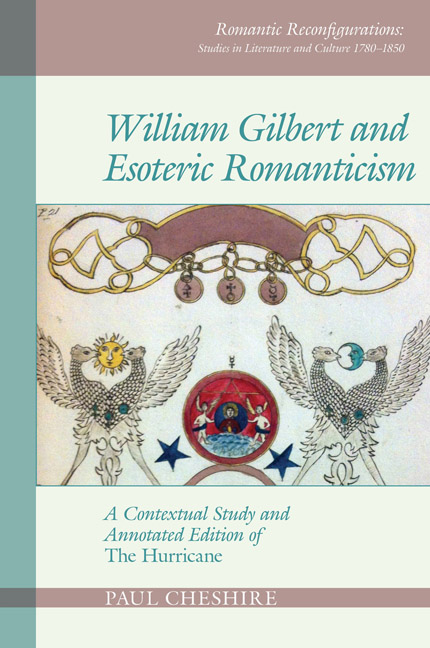 William Gilbert and Esoteric Romanticism
William Gilbert and Esoteric Romanticism Book contents
- Frontmatter
- Dedication
- Epigraph
- Contents
- Acknowledgements
- Abbreviations
- List of Figures and Illustrations
- Introduction
- Part One William Gilbert in Romantic Culture
- 1 A Magus of the 1790s: William Gilbert in Bristol and London
- 2 Bristol and the First Romantics
- 3 ‘With no unholy madness’: Gilbert and Coleridge
- 4 ‘My astrological friend’: Gilbert and Southey
- 5 The Calenture: Gilbert and Wordsworth
- Part Two The Hurricane
- Part Three Conclusion
- Bibliography
- Index
2 - Bristol and the First Romantics
from Part One - William Gilbert in Romantic Culture
- Frontmatter
- Dedication
- Epigraph
- Contents
- Acknowledgements
- Abbreviations
- List of Figures and Illustrations
- Introduction
- Part One William Gilbert in Romantic Culture
- 1 A Magus of the 1790s: William Gilbert in Bristol and London
- 2 Bristol and the First Romantics
- 3 ‘With no unholy madness’: Gilbert and Coleridge
- 4 ‘My astrological friend’: Gilbert and Southey
- 5 The Calenture: Gilbert and Wordsworth
- Part Two The Hurricane
- Part Three Conclusion
- Bibliography
- Index
Summary
As a nucleus, so many men of genius were there congregated, as to justify the designation, ‘The Augustan Age of Bristol’.
Joseph Cottle, CER, pp. ix–x.Gilbert was back in Bristol by May 1795. One possible link with the city was his Aunt Grace, who had moved there in 1792. She was married to one Captain Thomas Webb, who had lost an eye and nearly died in the 1759 battle for Quebec. With his eye-patch and military bearing he cut a striking figure as a lay Methodist, preaching in full uniform ‘with his drawn sword laid across the pulpit cushion’. Although approaching seventy and plagued by gout, he initiated fundraising towards the building of a Methodist chapel in the new residential area of Kingsdown on the slopes above the city, where he and Grace lived (Bates, pp. 32–3). Grace's surviving letters make no mention of William, whose revolutionary zeal and leanings towards occultism might be viewed as putting him at odds with these pillars of local Methodist society. The Methodist Arminian Magazine had, after all, printed in 1793 a disapproving account of what it called John Henderson's ‘reprehensible […] knowledge of the occult sciences of Magic and Astrology!’
However, such divisions were by no means clear cut: Captain Webb, according to a dinner guest, would describe the angels he had seen and his converse with spirits. The ex-Methodist bookseller James Lackington commented in 1791, the year of John Wesley's death, that many Methodists were defecting to the recently formed Swedenborgian church, which was then ‘gaining ground very fast’. Lackington's dismissal of this migration as ‘the fondness of mankind for novelty, and the marvellous’ (p. 291), reflects his own disenchantment: the appeal of Methodism had been, in its early days, the promise of religious experience, a ‘claim to extraordinary revelations of powers from the Holy Spirit’ that the established church had condemned as ‘enthusiasm’. As Methodism settled into respectability, such experiences were no longer courted or encouraged, and some members felt that to be a loss. Gilbert, although not formally a member of the Swedenborgian church, seems to have had a foot in both camps: while in Bristol, he acted as an intermediary for a local Methodist who was attracted to Swedenborg's writings, and wanted to know what other Methodists in Shropshire, with whom Gilbert had family connections, thought of them.
- Type
- Chapter
- Information
- William Gilbert and Esoteric RomanticismA Contextual Study and Annotated Edition of ‘The Hurricane’, pp. 42 - 60Publisher: Liverpool University PressPrint publication year: 2018


